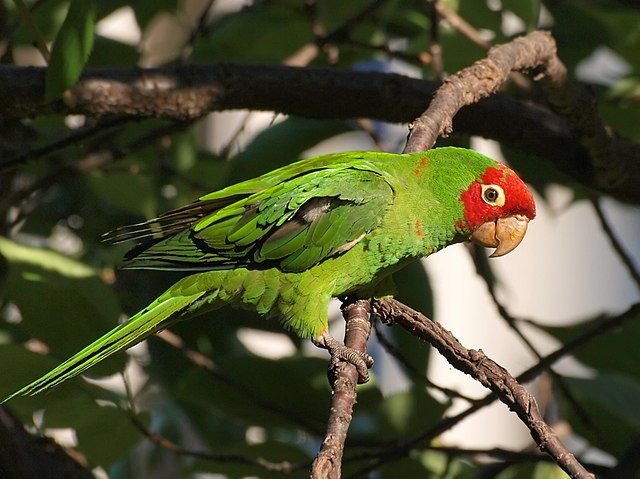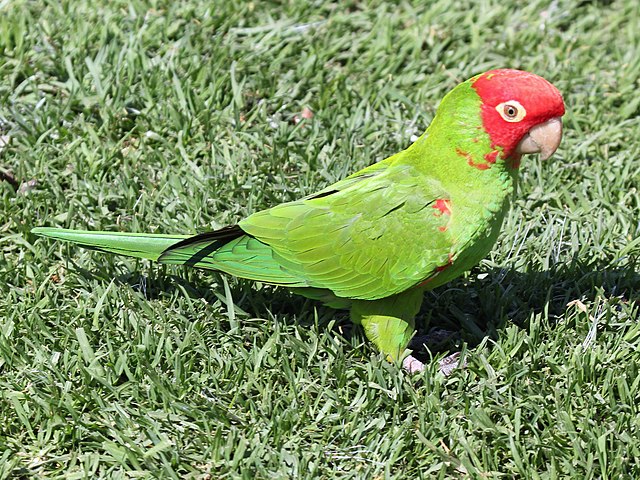Cherry-Head Conures, also known as the “Cherry-Headed Conure” or “Crimson-bellied Conure” are a small parrot species known for their bright red head and green body. They are lively and playful birds that make great companions. They are known to be quite vocal and have a wide range of calls and sounds. They have a lifespan of around 20-30 years with proper care. They require a lot of attention and interaction with their owners and can become bored or destructive if left alone for long periods of time. They are also intelligent and can learn tricks and even mimic words and phrases with patience and proper training.

Common Issues With Cherry Head Conures
Has your beautiful little Cherry Head Conure transformed into a shrieking, biting, thrashing little monster? Is he pulling his feathers out by the mouthful? Is he jealous of pets, children, or other members of your family?
You’re not alone. Many Conure owners find themselves in the exact same position. The cause…frequently begins with a few raging hormones but it escalates when owners don’t know how to handle the new behaviors. Not to worry, it’s never too late to get your loving bird back. Here are three tips to help you find that loving Cherry Head you once knew.
Make sure that your beautiful Conure is getting the ideal environment
This means that his cage is the right size. Make sure it is big enough that he can explore both vertically and horizontally without bumping into perches, toys, or fellow birds. Speaking of cages, what is in your Cherry Head Conure’s cage? Does he have a wide variety of new toys to play with and explore? Your Cherry Head is an intelligent bird. Make sure he is stimulated.
Food and sleep are other matters. The best food is an organic pellet-based diet. If your bird isn’t getting the proper nutrition, he could be feeling ill. What happens when you don’t feel good? You get cranky, right? Your bird does too. Feed him well and you’ll eliminate half of his behavior problems. That goes for sleep too.
No one is happy when they’re tired. Your Cherry Head Conure needs between 10-14 hours of sleep to feel happy and healthy. If this means moving him to a quieter room in the evening, then take those steps. You might be surprised to find that his behavior problems are completely eliminated.

Rule out behavioral causes for Cherry Head Conures
Okay, so you’ve established an ideal environment for your Cherry Head Conure, if he’s still misbehaving: biting, screeching, plucking, etc., then it is time to take a look at behavioral causes.
I mentioned that hormones are often to blame for the change in behavior. Sexual maturity causes all sorts of interesting changes, in children and in birds. Extreme feather plucking can be a direct result of courting with too much enthusiasm. Biting too can just be a way for your teenage bird to say in his best adolescent voice, “Leave me alone.”
Is he simply trying to get your attention? Quite possibly your Cherry Head is plucking his feathers, screaming, or biting simply to get your attention. Maybe he only screams when you’re in the room.
Do you run over to him to get him to stop? If so, you may be encouraging the behavior. The same goes for biting. If he learns that you pull your hand away and leave him alone, he learns that a bite results in his desired outcome. It teaches your Conure that he’s the boss.
Trick-train Your Cherry Head Conure
You’re the boss, right? The only way to lovingly and effectively teach your Cherry Head that you make the rules in the home is to trick train. The good news is that once you establish a foundation of trust, trick training will become fun for both of you. It will eliminate biting, screeching, thrashing, and other bad behavior.
Of course, you have to know how to train your bird the right way. If you don’t, the behavior can get worse. The best way to effectively train your bird is to consult an expert.
